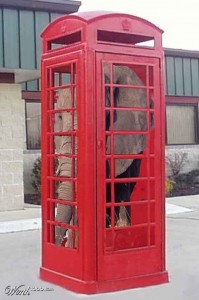 Social Studies
Social Studies  14 Comments
14 Comments Pass the Bucket
 I cringe as soon as I hear the bell ringing in front of the grocery store. My kids are primed to be generous, and immediately pester me for pocket change to put in the red bucket. I tell them “no” quietly and, to head off the inevitable “why” that follows, say, “They don’t believe they have to help everyone who comes to them in need, and I don’t want to support that.” I fast-walk the boys into the store and give the bellringer a tight smile.
I cringe as soon as I hear the bell ringing in front of the grocery store. My kids are primed to be generous, and immediately pester me for pocket change to put in the red bucket. I tell them “no” quietly and, to head off the inevitable “why” that follows, say, “They don’t believe they have to help everyone who comes to them in need, and I don’t want to support that.” I fast-walk the boys into the store and give the bellringer a tight smile.
This routine defies every philanthropic fiber in my being. We take things to Goodwill, we buy poppies from veterans, we buy Girl Scout cookies (okay, that one’s got side benefits). We support public radio and television, we give to our church, we buy ridiculous things from school fundraisers. Lupus, leukemia, lymphoma, lumbago–we give to them all. We collect pennies in UNICEF and Guest At Your Table boxes, which fall apart under the weight of the change every time.
But I will not give one copper penny to the Salvation Army.
SA hits many criteria that appeal to folks who want to do good. They work on first-order needs–feed the starving, shelter the homeless, clothe the poor–often in emergency situations. Especially at the holidays, when so many appeals come from charitable organizations, it can be difficult to prioritize causes, and SA makes it easy: give money here, help people in need. They even use a low-pressure ask, simply ringing a bell, rather than shaking a coffee can in people’s faces.
But SA’s help is given conditionally. If you want a meal, a cot, a coat, you must attend Christian worship. These aren’t gentle ecumenical services, either. You will be told you are full of sin, that your current problems have roots in your inadequate acceptance of Jesus Christ as your personal savior, that repentance and sacrifice are needed, and that only the saving power of the Christian God can take away your temporal suffering. There is fire and there is brimstone. There is even heresy, depending on your Christian theology–SA preaches “Lordship Salvation” which requires constant human effort for salvation.
And all that assumes that they’ve let you in the doors in the first place. SA’s track record for turning away gay and lesbian people in need is well documented, even those in committed partnerships. A British chapter even turned away a naked, injured rape victim because they “only serve men” at their location, despite the organization’s stated policy to make counseling and emergency assistance available to crime victims.
If that doesn’t disturb you enough to pass the pail, consider what happens to some donations. SA has used charitable gifts to support anti-gay legislation in America and abroad. Other SA officials have seen fit to throw away brand-new, donated, Harry Potter toys and books, because they didn’t want to be complicit in turning recipients toward Satan. And still others have simply helped themselves to the largesse they collect for others. We don’t even have a clear idea how much money SA takes in, or how it moves around within the organization, because for most of their operating history, they’ve hidden behind the IRS disclosure shield for churches.
I’ll admit that a big part of my personal problem with this organization comes from our differing views on the definition of “salvation” and how you get there. Militant religion has made me queasy since the first time I understood the words of “Onward, Christian Soldiers.” Never forget that SA stands for Salvation Army, not Salvation Association or Salvation Achievers.
And before their symbol was this: 
it was this: 
I don’t believe anyone needs to be “saved,” and I don’t think scaring and shaming them would do it, even if they did. I believe that good acts are their own reward, and that there should never be a cost for help, especially not one that amounts to emotional extortion in a person’s most powerless moments.
If you really want to do good–and another thing I believe is that everyone really does want to do good–there are so many places that need you. If you feel like freezing your butt off, don’t just stand there ringing a bell–take meals to the homeless and invite them into life-saving shelters on the coldest of nights. If you have a strange attraction to American coinage, collect it for your local food shelf so families can enjoy a special holiday meal. If you want to spread the message of your holy days, help your church or temple with its social justice projects. And if you just don’t know where to start, look right around you. Your neighbors, your friends, your family, you all know someone who’s hurting: a person facing a holiday alone, or hungry, or scared, or without the tools or means to give the children in their lives the wonder and joy so many of us associate with this time of year.
It doesn’t take an army to save people. We can save each other, with our own hands and hearts and wide open eyes.



 Haidt also shares the results of his research into the moral foundations on which the edifices of conservative and liberal thought are built, and his conclusion is that part of the success of the modern conservative movement is based on the fact that conservative ideology appeals to a broader array of moral options than liberalism does. Since liberals often think of conservatives as “narrow-minded,” this sounds counter-intuitive, but really, it’s not. Liberals, Haidt demonstrates, derive their moral judgments almost entirely from whether something cares for or harms other beings, or whether it seems equalizing or discriminatory. Conservatives, on the other hand, respond less strongly to equality and care/harm, but additionally respond to messages of proportionality (more/less work=more/less reward), loyalty (to kin and other identity groups), sanctity (upholding standards of purity or pollution), and authority (respect for institutions), while many liberals actually perceive a threat from high degrees of those sources of morality. I think he’s really on to something, and I agree with what I heard Howard Dean talk about in a speech at Penn State, all the way back in 2004–that progressives won’t be able to accomplish their goals until they learn to articulate the morality of their position from all of these angles, and tap into the emotional heart of their message.
Haidt also shares the results of his research into the moral foundations on which the edifices of conservative and liberal thought are built, and his conclusion is that part of the success of the modern conservative movement is based on the fact that conservative ideology appeals to a broader array of moral options than liberalism does. Since liberals often think of conservatives as “narrow-minded,” this sounds counter-intuitive, but really, it’s not. Liberals, Haidt demonstrates, derive their moral judgments almost entirely from whether something cares for or harms other beings, or whether it seems equalizing or discriminatory. Conservatives, on the other hand, respond less strongly to equality and care/harm, but additionally respond to messages of proportionality (more/less work=more/less reward), loyalty (to kin and other identity groups), sanctity (upholding standards of purity or pollution), and authority (respect for institutions), while many liberals actually perceive a threat from high degrees of those sources of morality. I think he’s really on to something, and I agree with what I heard Howard Dean talk about in a speech at Penn State, all the way back in 2004–that progressives won’t be able to accomplish their goals until they learn to articulate the morality of their position from all of these angles, and tap into the emotional heart of their message.
 I’m volunteering for
I’m volunteering for 



